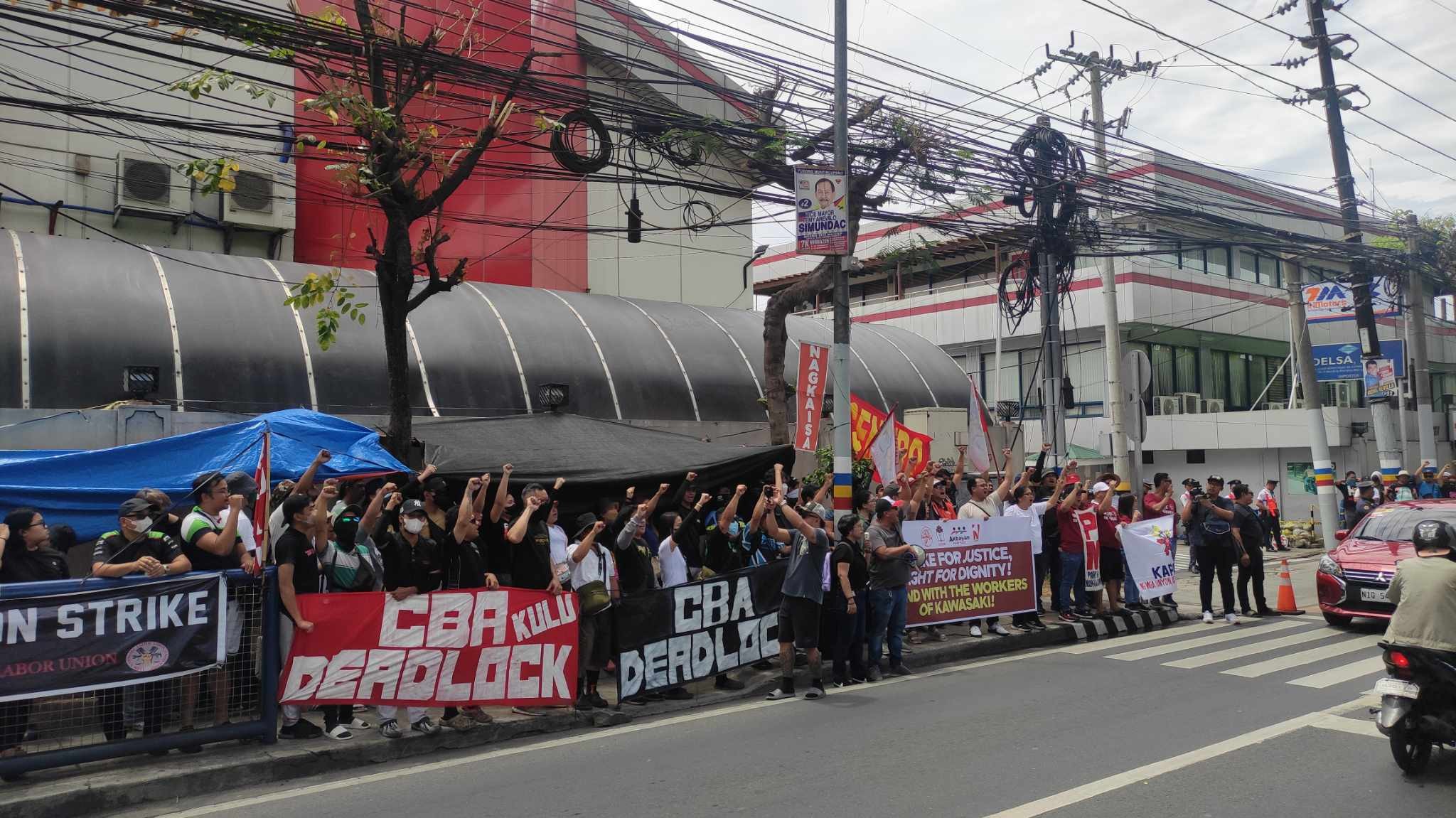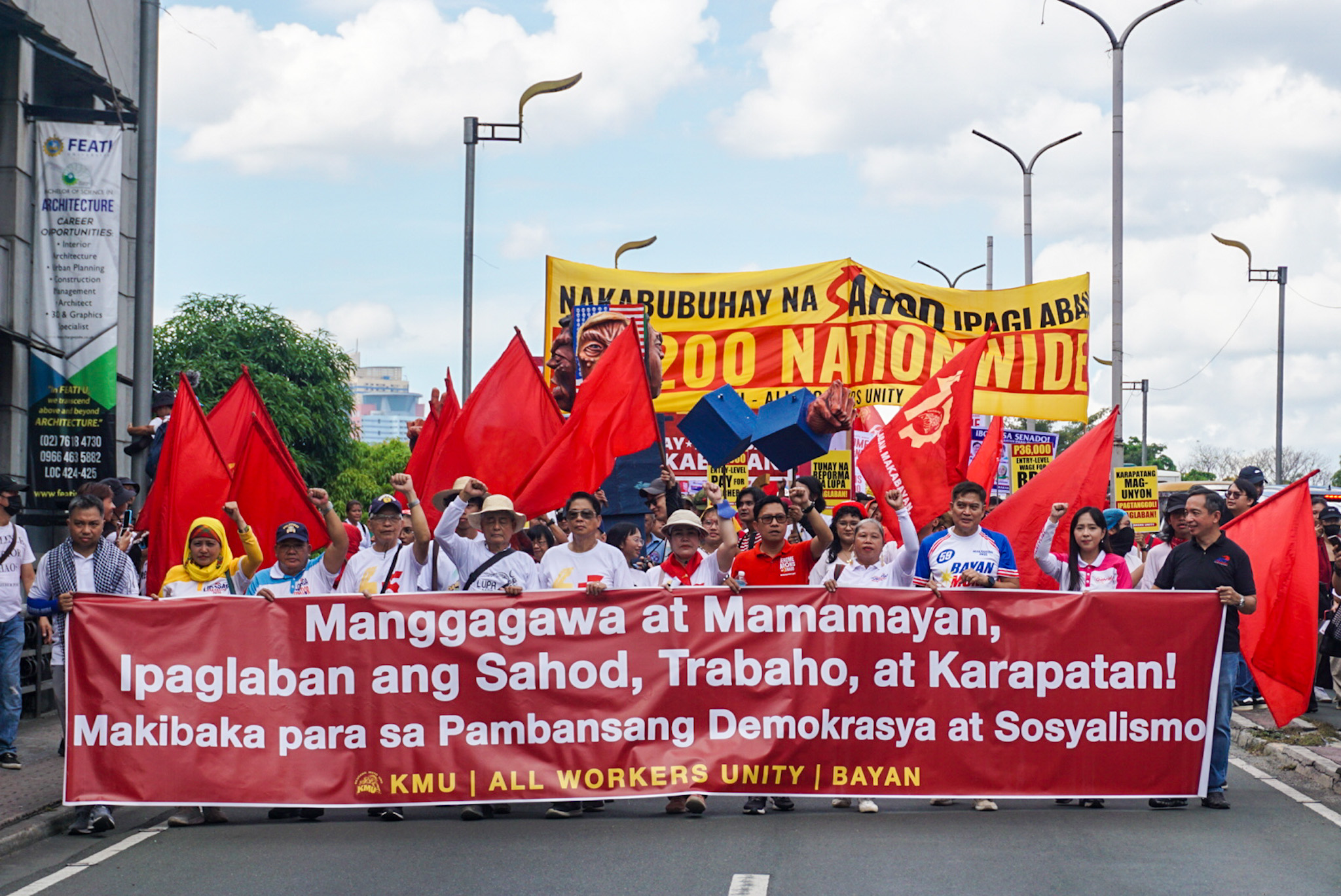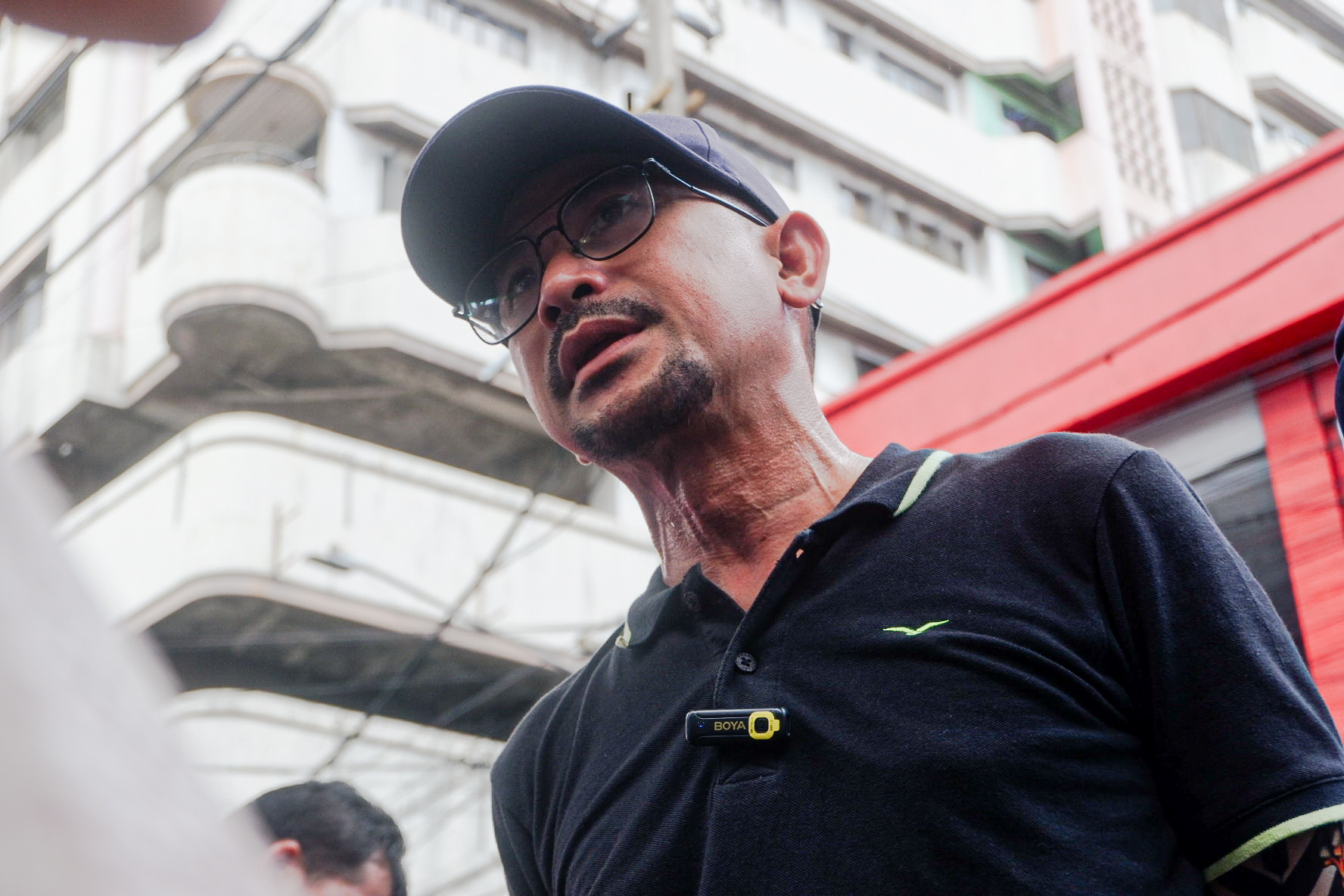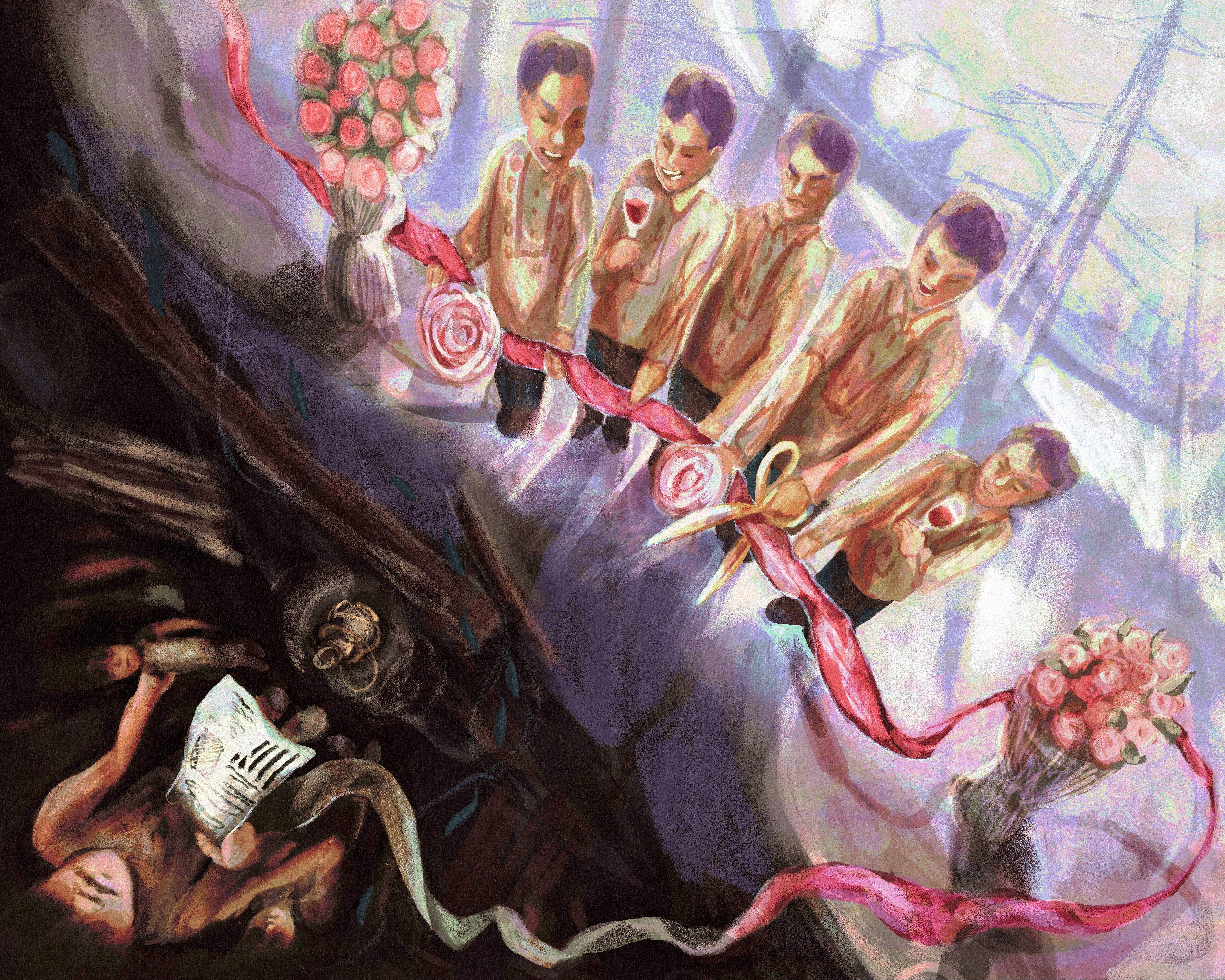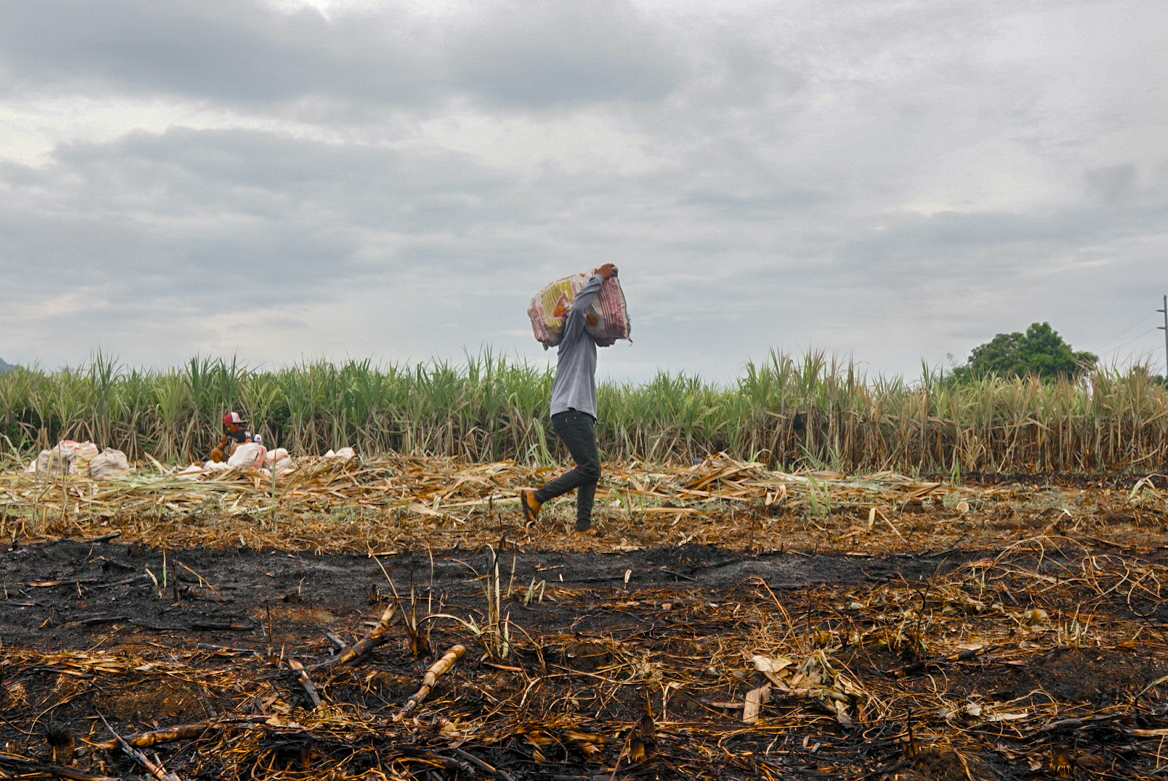A historic strike is underway just outside Kawasaki Motors Philippines Corporation in Muntinlupa City. Stonewalled negotiations for a collective bargaining agreement forced the Kawasaki United Labor Union (KULU) to stage a picket for the first time in 57 years on May 21.
At the third week of the protests, Kawasaki management still deliberately snubs dialogue with its workers, according to the union’s President Richard Balberan and Board of Directors member Jhay-r Taruc.
Around 140 workers with hardened resolve stand by the picket line. Among them are quality control auditors RJ and Mar, who requested anonymity to protect themselves from corporate retaliation. They have endured all kinds of weather conditions holding the picket line. “Nakaranas kami na lumindol. May times din na naulanan, mausok. Mahirap,” RJ said.
Kawasaki has so far repeated its claims of impending closure and financial loss as justification for withholding months’ worth of wages and benefits. This casts workers as burdens when, in reality, they are the backbone of the company’s billions in earnings.
Standstill Negotiations
With negotiations stalled and the management adopting an increasingly hostile stance, workers saw no choice but to launch a protest to air their demands.
The collective bargaining agreement had been delayed for almost a year due to disputes over workers' welfare. During the initial plant-level negotiations, KULU proposed a 12% wage hike. The management countered with a 7% increase, and the union lowered its proposal to 11.5%. Kawasaki refused to negotiate further, resulting in a deadlock.
The average salary of a rank-and-file Kawasaki worker is at P37,000 per month, according to the union. This is below the P42,000 figure set by the National Economic and Development Authority to comfortably sustain a family of five.
Once bargaining shifted over to the Department of Labor and Employment (DOLE), the management not only withdrew their offer of a 7% salary increase but also slashed 21 benefits, such as transportation allowances and sick leaves, which were not even in contention during initial negotiations. They now remain firm on a lowball proposal: a 5% wage hike and the reinstatement of only six benefits.
The absurd offer will leave workers worse off than they were before, forcing KULU to strike. Workers are also firm not to submit to the company’s offer, however. Once workers concede on the management’s terms, the union will have essentially surrendered its bargaining power in negotiations, RJ said.
Each day from 6 a.m. to 5 p.m., workers brave the heat, rain, and smoke on the picket line. They huddle together beside the expressway, under tarps stocked with food and water, while a sound system broadcasting their calls clashes with the roar of passing traffic.
 Tarps serve as makeshift camps for the workers as they sustain a weeks-long siege.(Patrick Kyle Adeva / Philippine Collegian)
Tarps serve as makeshift camps for the workers as they sustain a weeks-long siege.(Patrick Kyle Adeva / Philippine Collegian)
The picket has become a test of endurance, and the workers have sacrificed weeks of their time to maintain their ground. “Gusto talaga namin pumasok syempre. Yung sahod din yung inaasahan namin para makapag-provide sa family namin. Pero wala kaming choice,” RJ said.
Instead of compromise, Kawasaki has responded with hostilities designed to demoralize its workers. The management blasts company hymns during picket programs to overpower their chants. Branches from nearby trees were cut to make it difficult to tie tarps and banners. Kawasaki also imposed a lockout or stoppage of operations to prevent rank-and-file union workers from entering the premises.
 Company hymns are blasted at the gates during picket programs to overpower the workers’ voices. (Patrick Kyle Adeva / Philippine Collegian)
Company hymns are blasted at the gates during picket programs to overpower the workers’ voices. (Patrick Kyle Adeva / Philippine Collegian)
Gaining Ground
But the union’s demands are neither excessive nor unreasonable. Rather, it is a fairer distribution of profit that has been withheld from them for years.
Kawasaki management defended its unreasonable offer under the pretext of financial distress that may result in retrenchment, transfer of operations, and closure. KULU has criticized this as a facade to scare off salary negotiations and deny them fair share of profits—a bargaining tactic Kawasaki has overused, the union said.
Kawasaki, however, is no small firm. In the last three years, the multinational company amassed P35 billion in revenue, yet only P299 million went to workers, according to financial statements obtained by KULU. A 12% wage hike amounts to a mere 0.86% of Kawasaki’s projected revenue for the next three years, a fraction of the wealth stingily denied to the workforce that generated it. With 18,000 motorcycles produced each month, Kawasaki thrives on the business model of uncompensated labor.
The company is allegedly undergoing a recovery plan, but Balberan disputes this narrative. He claims that Kawasaki has approved mass promotions and retained company events like team-building activities for higher-ups. At the same time, those for rank-and-file employees have been cut.
“Sa isang kumpanya, sino bang gumagawa ng pera? Di naman yung HR. Di ba yung production? Yung production yung nagiging kawawa. Tapos kami yung laging tinitipid,” Mar said.
While the management enjoys its perks, rank-and-file workers struggle to make ends meet. Kawasaki is unwilling to accept that while it supposedly foresees a financial downturn in the far future, the workers’ need for decent wages is immediate.
Sustaining the Siege
As the deadlock drags on, KULU remains resolute in their fight for just worker welfare. “Pag may pang-aabuso o may karapatan sa paghingi ng sweldo ang hindi naibibigay, [ang pagwewelga] ang huling sandata ng manggagawa,” Taruc said.
Progressive organizations from around the country have rallied behind KULU for their actions. Labor groups like Nexperia Workers Union, whose successful strike granted them better labor conditions, have donated supplies to sustain the picket, while labor leaders like Luke Espiritu joined their programs.
Even if claims of financial losses are true, the union said that it is willing to negotiate to continue company operations as long as demands for dignified wages are upheld.
In the most recent conference with DOLE on June 3, KULU lowered its proposal to a 10.5% wage hike to invite progress. This fell on deaf ears once again as management rebuffed the offer and stubbornly asserted its 5% proposal.
Despite the challenges foisted upon them, the union remains steadfast in their picket, rallying under the call of “Ang laban ng KULU ay laban ng lahat.” In doing so, KULU stands as a fighting symbol for other unions to assert their rights and strike.
Until Kawasaki management shows genuine cooperation, Kawasaki United Labor Union will stand its ground—both in its demands and outside the company’s gates. The battle lines have been drawn, and the union is ready to outlast its oppressor. ●
First published in the June 10, 2025, print edition of the Collegian.
